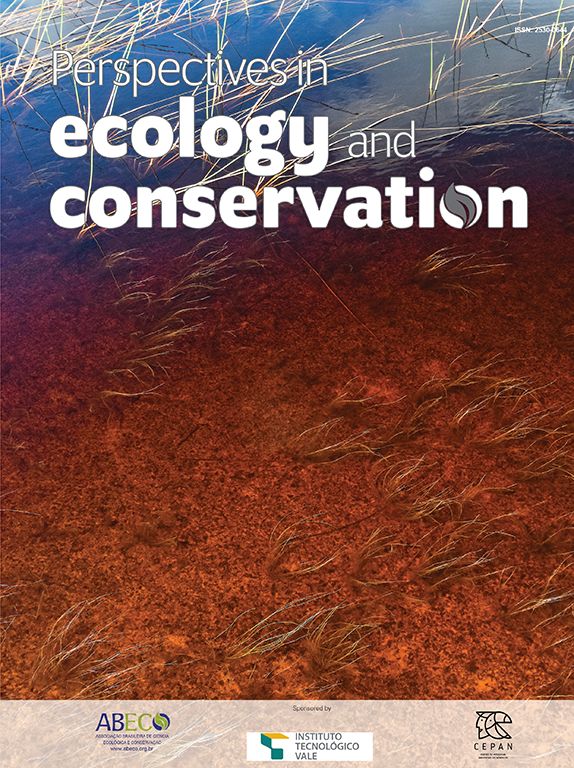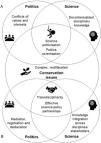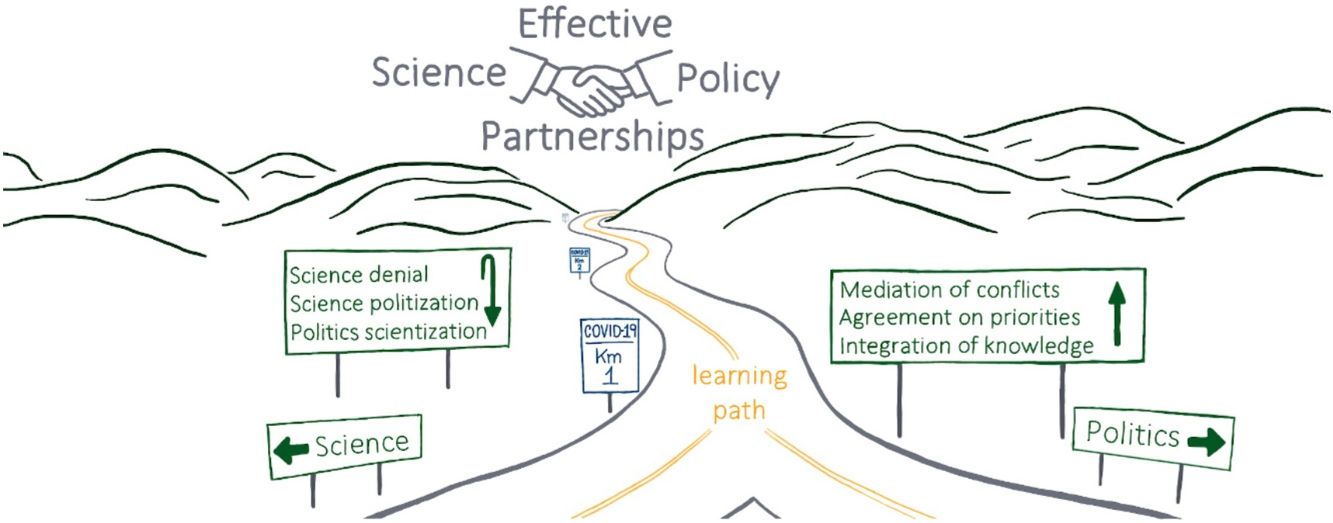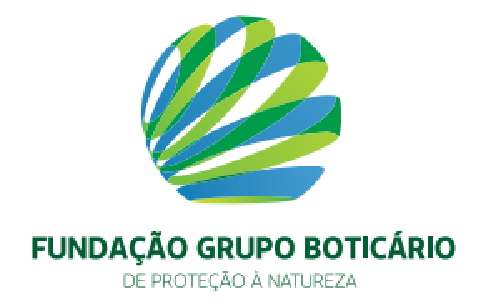COVID-19 pandemic brought to light examples of science denial and politicization while triggering the engagement of scientists in producing information to help policymakers. The pandemic is thus an opportunity to reflect on crucial issues: What conditions facilitate science politicization and politics scientization? What can be done to avoid these dangers and effectively ground policies in science? These issues are particularly relevant for conservation science and practice, as they encompass complex problems with multifaceted consequences and conflicts of values and interests and are thus prone to science politicization and politics scientization. We propose that grounding policymaking in science requires recognizing that: (1) science is not value-free and should be immersed in a broader process that includes conflict mediation to agree on goals; (2) science-policy partnerships should function as transdisciplinary processes; and (3) changing scientific policies and training is vital to break the vicious cycle that maintains science disconnected from society.
In a period of societal discredit in science, COVID-19 pandemic has brought science to center stage in the media and decision-making. By doing so, the pandemic has opened a window of opportunity for the public, scientists, and policymakers to question and learn about the role and limits of science in democratic societies, and what is needed to ground policies in science. These are critical albeit overlooked topics, central to all scientific endeavors. It is, however, especially relevant to mission-oriented fields focused on complex problems that involve conflicts of values and interests, as conservation science (Mason et al., 2018; Redpath et al., 2013).
Many have argued that COVID-19 pandemic is an experiment on the effects of human confinement and its relaxation on biodiversity (Bates et al., 2020; Rutz et al., 2020). Alternatively, we here propose that the pandemic is also a path for reflecting and learning on science-society issues and on implementing effective collaborations between scientists and policymakers that are crucial to conservation. In the sections below, we first present both negative and positive issues concerning the relationship between science, politics and policy that COVID-19 pandemic brought to light. We then argue why these issues are particularly relevant for conservation. We end up by pointing out what is needed for effectively grounding policies in science.
Science, politics and policy – the issues COVID-19 pandemic brought to lightBy putting science on center stage, the pandemic brought to light diverse processes – with both negative and positive consequences – concerning the relationship between science, politics and policy. On the one hand, we have witnessed many examples of political manipulation of science (Abbasi, 2020; Stevens, 2020), including politically motivated denial of scientific evidence (Nature Medicine, 2020). This process that deters the use of science to confront societal problems has always been common (Druckman, 2017; Goldberg, 2017). Nonetheless, during the pandemic such manipulation was constantly exposed in the news, together with counteracting claims – including from many scientists – on the need to just follow science recommendations (Pulido et al., 2020)
However, it has long been accepted by experts in the political sciences that decision-making requires more than scientific knowledge. Decision-making involves the dispute of interests and conflicts of values within societies, requiring political mediation, negotiation and deliberation to reach agreement (see reviews in Cairney, 2016; Jasanoff et al., 2001; see also Stevens, 2020). Thus, claims to just follow science recommendations are unfounded in the realities of decision-making (Schrager, 2020). In fact, expecting science to lead directly to decisions – and not taking conflicts of values and interests into account – is the ultimate cause of science politicization and politics scientization (Pielke, 2004a; Sarewitz, 2015).
Science politicization occurs when science is manipulated (i.e. scientific information is either decontextualized, selectively used or denied; Diethelm and McKee, 2009; Goldberg, 2017) for political gain and used as a weapon by opposing sides, making science hostage to a political war (Pielke, 2004b). In such scenarios, science might actually make controversies worse (Sarewitz, 2004) instead of supporting decision-making (Fig. 1A). A consequence of politicizing science is politics scientization (Scholten and Verbeek, 2015). As science is manipulated for political gain, political issues (related to conflicts of values and interests within society) are taken as scientific questions. By leaning on the false, but prevalent idea (also within academia), that science can act as a neutral arbiter (Walker, 2003), politicians escape from their duties of mediating conflicts (Fig. 1A). An example of these processes during the pandemic was the chloroquine/hydroxychloroquine debate. Despite most studies showing a lack of efficacy of these drugs, some politicians denied the scientific consensus and leaned on a single, contested initial study to promote the drugs as cure for COVID-19 (Saag, 2020), and support the relaxation of physical distancing measures to supposedly favor the economy. What followed was an intense debate about what counts as evidence, which studies were available, and which method is adequate to assess effectiveness (Berlivet and Löwy, 2020), transforming the political question “economy versus health” into a scientific question.
Key aspects and intersections between science, politics and conservation issues in two contrasting situations. A. When science politicization and politics scientization result from using decontextualized, disciplinary scientific knowledge on complex multifaceted issues to support a political view, leaving behind the conflicts of values and interests. B. When transdisciplinary processes are conducted within science-policy partnerships by integrating interdisciplinary knowledge and knowledge of relevant stakeholders to focus on a goal related to a conservation issue that was agreed through mediation and negotiation of values and interests.
On the other hand, a positive outcome of the pandemic has been the engagement of scientists in communicating issues related to the disease and in producing relevant information to confront its spread (Buxton et al., 2020). In many countries, such as Brazil, scientists organized themselves to produce key information concerning analyses of the number of infected people, deaths and occupied Intensive Care Unit beds (Fraser, 2020; Roehrl et al., 2020; InfoGripe; MonitoraCovid-19; Observatório Covid-19 BR; Observatório Covid-19 Fiocruz; Painel: COVID-19 no Brasil). These endeavors indicate there are scientists open to collaborate with policymakers (see also Bertuol-Garcia et al., 2020).
Hence, the pandemic broadly exposed in the media examples of, on the one hand, political manipulation of science counteracted by claims to just follow science recommendations, and, on the other hand, engagement of scientists in producing relevant information. Although other important processes related to science (but not necessarily to policy) were also observed during this period (e.g. academic extractivism; Hellmann et al., 2020), we will here take the opportunity opened by the pandemic to reflect on key science-policy issues. What conditions facilitate science politicization and politics scientization? What can be done to avoid these dangers and effectively ground policies in science?
Why do these issues matter for conservation?Reflecting on these topics is critical for conservation science and practice for several reasons. First, conservation problems are particularly prone to science politicization and politics scientization (Fig. 1A). This is because both are more likely when scientific knowledge refers to two, often connected aspects that are common in conservation – complex systems and issues with multifaceted consequences (Herrick and Sarewitz, 2000; Sarewitz, 2004). In complex systems, cause and effect relationships are difficult to identify and forecasts are variable (i.e. dependent on several details), as in ecosystem management (DeFries and Nagendra, 2017) and climate change (Maslin and Austin, 2012). In multifaceted issues, attitudes depend on the perspective (values and interests) through which issues are evaluated, leading to conflicts across individuals or groups. The consequences of genetically modified foods, for instance, vary across agricultural, social and ecological dimensions (Hicks, 2015; Sarewitz, 2004). Both complex systems and multifaceted issues with conflict of interests then facilitate manipulating (selecting, decontextualizing, or denying) scientific information to support a viewpoint or political discourse (Sarewitz, 2004; Lewandowsky and Oberauer, 2016). As climate politics in the US and UK exemplify (Sarewitz, 2010), science politicization and politics scientization are indeed likely in conservation.
Second, the role and limits of science in decision-making have frequently been overlooked in conservation. A comprehensive review of the literature has shown that ecologists and conservation scientists have a naive perspective on the causes of the science-practice gap, disregarding the complexity of socio-political contexts that make direct use of scientific evidence by policymakers unfeasible (Bertuol-Garcia et al., 2018). Ignoring these issues by assuming that science can directly lead to decisions is the ultimate cause of science politicization and politics scientization (Pielke, 2004a; Sarewitz, 2015).
Finally, a unidirectional perspective of knowledge transference from science to policy predominates in the ecology and conservation literature, in particular the evidence-based conservation approach (Bertuol-Garcia et al., 2018). By focusing on the centrality of scientific information to conservation practice, this approach implicitly assumes that science can directly lead to decisions, ignoring conflicts of values and interests and the uneven distribution of power among actors in conservation (Toomey et al., 2017), potentially perpetuating the mismatch between social and ecological justice (Kareiva and Marvier, 2012). Only recently, horizontal collaborations between scientists, policymakers and other actors have been advocated as crucial to conservation (Enquist et al., 2017; Rose, 2018). Yet, such collaborations are key to conservation, as environmental issues encompass complex problems and a myriad of values and interests, that should be dealt with not only to avoid science politicization and politics scientization (Fig. 1), but also to confront structural inequalities in conservation. These collaborations can also help moving away from mainstream, globally developed and disconnected from local realities, "one size fits all" policies that have been reported to hinder conservation (Boedhihartono et al., 2018).
Below, by synthesizing ideas from different scientific fields, we explore what is needed to effectively ground policies in science, focusing on three aspects: the role and limits of science in society and its relation to politics; the centrality of effective science-policy partnerships to account for diverse knowledge and values, avoiding political manipulation of sciences; and what is needed to accomplish such effective partnerships.
What is necessary to ground decision-making in science?Science is not a neutral arbiter – the need for agreeing on priorities and goalsIn contrast to the idea that prevails also within academia, science is not a neutral arbiter that can resolve conflicts of values and disputes of interests, such as those related to genetically modified foods and climate change. Science is also not a privileged actor, especially in terms of values and interests. Getting to an agreement across societal sectors with different needs and interests over what is valued and should be prioritized is the role of politics. Science may be called to this political arena to inform, helping to clarify the issues at play. Yet, for scientific analyses to be integrated and support policymaking, they should be immersed in a broader, inclusive process that involves – at a first step – reaching a democratic agreement on priorities and goals through political mediation (Sarewitz, 2015).
The quest for inter- and transdisciplinarity – the need for integrating knowledge and valuesScience is also not value-free; rather values are key in science. Science impartiality, for instance, requires that only epistemic values related to empirical adequacy, explanatory power, consistency, and coherence are involved when evaluating theories and hypotheses (Lacey, 2005). However, personal (social, political and ethical) values are involved not only when scientists choose how to disseminate or apply research results, but also when they define the domain of phenomena to study and research strategies to use (Lacey, 2005). Therefore, interdisciplinarity is crucial when science is called to inform and clarify issues at play in the political arena, or to participate in processes to define strategies for achieving a politically agreed goal. Integrating different disciplines allows considering the variety of phenomena (e.g. ecological, social, economic, etc), partial understanding and the shared underlying values from multiple scientific fields. Like COVID-19, whose confrontation requires contributions from many disciplines (El-Hani and Machado, 2020; Habersaat et al., 2020; Moradian et al., 2020), conservation issues need integration between natural and social sciences (Bennett et al., 2017).
However, decision-making concerning societal problems requires not only scientific knowledge from multiple disciplines but also experiential, traditional, or strategic knowledge from all relevant stakeholders (Scholz and Steiner, 2015). In any type of science-policy partnerships, the strategic knowledge of public administrators (managers, technicians, policymakers) – who deal daily with the challenge of articulating technical criteria to economic, social and political outcomes – is key for evaluating the viability and effectiveness of a decision (Hulme, 2014).
Hence, two aspects are key for science to support policymaking: democratic deliberation that articulate values and interests and legitimize the intended goal, and the integration between disciplines and between scientific and non-scientific knowledge to define a strategy to meet this goal. As such, effective science-policy partnerships could be seen as transdisciplinary processes (Fig. 1B). Those processes focus on societal problems through horizontal collaborations between scientists, decision-makers and all relevant stakeholders and include negotiations of perspectives and values, joint definition of goals and integration and co-production of knowledge (Scholz and Steiner, 2015). These horizontal and diverse processes confront the idea of science as a neutral and value-free endeavor, and as such contribute to avoiding reproducing hegemonic interests and structure inequalities in society (Bryant, 1998). Instead, by giving voice to different actors, they help decolonizing knowledge (Hall and Tandon, 2017).
In transdisciplinary processes, instead of being one more voice among many or having a privileged status in decision-making, science should work as a public good, serving all members (Scholz and Steiner, 2015), and scientists should strive to expand the range of alternative strategies to achieve the legitimized goal rather than advocating for a particular strategy (Pielke, 2007). There are, however, many other approaches from scientific fields as distinct as education (e.g. communities of practice; Wenger, 1998), psychology (e.g. action research; Lewin, 1946), medicine (e.g. translational science; Rubio et al., 2010), and community-based research (e.g. Sclove et al., 1998) that contribute with ideas on how to horizontally integrate science and practice/ policy and on the challenges of doing so.
The many initiatives among scientists to conduct analyses and inform the media and policymakers – a positive outcome of the pandemics (see above) – are a first step towards transdisciplinarity. Transdisciplinary processes, however, would require collaboratively working with technical personnel and policymakers to integrate scientific results with their knowledge, aiming at defining a policy to achieve a previously democratically agreed goal.
Breaking the vicious cycle – the need for changing scientific training and scientific policyEven though transdisciplinary processes have been advocated to approximate science from societal problems (Nature, 2018), most scientific policies and training do not facilitate engagement in these processes (Rocha et al., 2020). In general, scientific policies still follow a linear model of science-policy interface, assuming that robust knowledge is produced by scientists isolated from societal influences and is then used by other actors in decision-making and technological development (Pielke, 2007). Under this assumption, benefits from science to society do not require engagement in transdisciplinary processes, being sufficient to publish papers in scientific journals. As such, evaluation systems in science – key components of scientific policies – focus mainly on the number of published papers in high impact journals (Werner, 2015). As a result, the definition of research priorities ends up in the hands of large editorial companies (Neff, 2020), instead of being established in accordance with the needs of each country (e.g., Neff, 2018). Engagement in transdisciplinary processes – that requires time and does not always result in many publications – is not stimulated (Kaufmann and Kasztler, 2009; Kucharski et al., 2020).
In addition, most undergraduate and graduate programs in universities are discipline-oriented and focus exclusively on scientific specialization (Bosch, 2018). Although crucial, if not articulated with other approaches, disciplinary training hinders learning how to interact with other disciplines, actors and types of knowledge. The current scientific training also rarely emphasizes the role and limits of science in society (Clark, 2001; Lewinsohn et al., 2014), an essential topic to stimulate reflection on the need for horizontal collaborations with other actors to confront societal problems and challenge the status quo. Many have argued that students are key in bridging conservation science and practice (Courter, 2012); yet, in most cases, they are not receiving the appropriate training to fulfill that role.
These challenges create a feedback loop that maintains science discipline-oriented and disconnected from societal problems (Rocha et al., 2020). A proposal to break this vicious cycle contends that scientists engage in two processes: diversifying their interactions beyond their disciplines during daily academic activities of teaching and doing research and outreach, and debating scientific policies within their universities (Rocha et al., 2020; Fig. 2).
ConclusionWe argued that COVID-19 pandemic is an opportunity to reflect on the role and limits of science in confronting societal problems and on the challenges of grounding policies in science. In our view, this is of great value for conservation science and practice, as conservation problems concern complex and multifaceted issues and thus involve conflicts of values and interests and are prone to science politicization and politics scientization. To tackle such issues, we need not only science but also politics. As such, science-policy partnerships should encompass and mediate values and interests, and integrate knowledge across disciplines and stakeholders. Failing to address this diversity of perspectives within science and society deters the potential for science to support decisions and can instead lead to increased controversy and prevalence of hegemonic interests. Crucial to the endeavor of fomenting effective science-policy partnerships is breaking the vicious cycle of current scientific policies and training that discourage engagement in transdisciplinary processes.
Declaration of interestsThe authors declare that they have no known competing financial interests or personal relationships that could have appeared to influence the work reported in this paper.
We are grateful to Blandina Felipe Viana, Samanta Levita Coutinho, Pedro Luis Bernardo da Rocha e Charbel El-Hani for the opportunities to discuss the need for, and how to implement, inter- and transdisciplinarity in conservation, and to Dan Sarewitz whose texts and articles are a major source of inspiration. CNPq - Conselho Nacional de Desenvolvimento Científico e Tecnológico - and CAPES - Coordenação de Aperfeiçoamento de Pessoal de Nível Superior - funded the “Instituto Nacional de Ciência e Tecnologia em Estudos Inter- e Transdisciplinares em Ecologia e Evolução" (INCT IN-TREE) (465767/2014-1 and 23038.000776/2017-54, respectively). RP and PIP received a research fellowship from CNPq (311051/2018-9 and 310885/2017-5, respectively), FSR and MCP a PhD fellowship from CAPES (88882.327892/2019-01 and 88887.467966/2019-00, respectively), and BDA a MSc fellowship from CNPq (132564/2020-3), during the development of this work.










